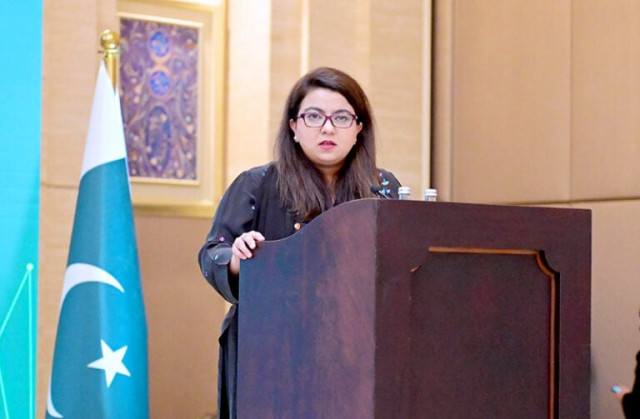PM prioritises Pakistan's digitisation and gender digital divide: Shaza Fatima
Shaza Fatima notes IT sector exports surged to 'a record $3.2 billion in 2024 year which is the highest ever'

Pakistan's Minister of State for IT and Telecommunication, Shaza Fatima Khawaja, emphasised the country's focus on digitization and bridging the gender digital divide as top priorities for Prime Minister Shehbaz Sharif.
Speaking at the launch of the Country Digital Ecosystem Diagnostic Report on Tuesday, jointly prepared by the Sustainable Development Policy Institute (SDPI) and the Asian Development Bank (ADB), Khawaja highlighted the government’s vision for a transformative digital future.
Addressing the ceremony, Khawaja congratulated the SDPI and ADB teams for their comprehensive report, describing it as a crucial document for setting future key performance indicators and goals in digitization. She announced that the Ministry of IT and Telecommunication would prioritise the implementation of the report’s recommendations.
"The IT sector exports surged to a record $3.2 billion this year, the highest ever," Khawaja noted. "The Prime Minister has a strong focus on digitization as IT exports continue to break records. The target is $25 billion in IT exports, and we are striving to meet it."
Khawaja highlighted the resilience and growth of the IT sector, stating that it received the highest budgetary allocations in the ongoing fiscal year, underscoring the government's commitment to digital transformation. "The country requires complete digital transformation, with digital economy, governance, and society as key pillars," she said.
She also mentioned the upcoming national policy on digitization and the Islamabad smart city project, aimed at developing a model digital city. "Every individual needs internet access. The gender digital divide in Pakistan is significant, and there can be no progress without addressing it. We are preparing a comprehensive digital plan that will be rolled out by the Prime Minister," she added.
The minister revealed that the government has allocated Rs 8 billion for IT training across various sectors to enhance internet and device accessibility and provide necessary training. "There is no alternate route to growth and development for the country. It's an opportune moment for Pakistan to embrace the challenge and explore further opportunities," she emphasized.
Prime Minister’s Coordinator on Climate Change, Romina Khurshid Alam, echoed the importance of digitization for the country's growth and economic stability. She noted that Pakistan faces severe competition due to emerging technologies and rapid digitization, and the Prime Minister is keen on transforming these challenges into opportunities.
Dr. Abid Qaiyum Suleri, Executive Director of SDPI, highlighted the report's significance, calling it a diagnostic study on Pakistan’s IT future. He noted the formation of a special group within the Ministry of IT to pursue digital initiatives and minimize human interference.
Suleri pointed out that digitization would improve governance, with 80% of transactions conducted online in the last fiscal year, amounting to Rs 840 million. "Without proper diagnosis, we can't embark on the fourth digital technology revolution. Strategic infrastructure and digital governance are essential for enhancing public service delivery," he stated.
The Deputy Country Representative of ADB-Pakistan commended the report, anticipating that its insights would guide policymakers towards better investments in digitization. "ADB is ready to support the government in this journey. The report provides a comprehensive overview of the current stage and future opportunities in the IT and digitization sector," he said.
Dr. Jordanka Tomkova, an IT and digitization expert, presented the technical insights of the report. She described it as a collaborative effort completed in six months, emphasizing the need for global cooperation in achieving digitization goals. "Pakistan's performance is an asset, ranking high in future technologies and the digital economy but low in human security. Connectivity and coverage are rising, especially mobile penetration," she noted.
Tomkova concluded by highlighting the four-pillar approach to embracing digitization: digital infrastructure, government, society, and economy, and stressed the importance of digital infrastructure as an economic growth indicator in Pakistan.



















COMMENTS
Comments are moderated and generally will be posted if they are on-topic and not abusive.
For more information, please see our Comments FAQ